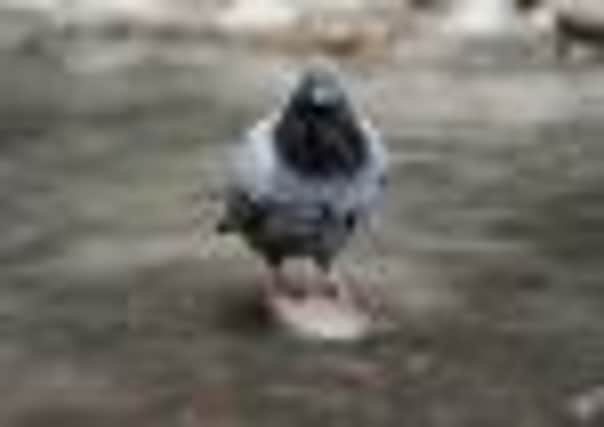Dead pigeon halts ERI operations


It is understood that the bird had managed to get into a cavity above a theatre ceiling through a gap which had opened up between guttering and a roof at the hospital before it died.
The infection risk led to two operating theatres being shut for a combined 11 days.
Advertisement
Hide AdAdvertisement
Hide AdWhile an investigation was being carried, out a third theatre was closed after its roof began to leak.


It is the latest scandal to hit Consort, the private company which built and runs the ERI and has responsibility for maintaining the hospital.
Under a controversial private finance initiative (PFI) contract, Consort is handed £60 million of NHS money every year.
Lothian branch chairman for Unison, Tom Waterson, said the closure of the theatres was only the latest in a “long list of catastrophes” to hit the ERI due to Consort blunders, and reiterated calls for an independent inquiry into the PFI contract.
Advertisement
Hide AdAdvertisement
Hide AdThe infection risk in theatres comes less than three months after a patient was operated on at the ERI by torchlight because Consort workers cut an electricity supply to carry out maintenance work too early.
Mr Waterson said: “You go back to when the contract was signed. The reason it was deemed cheaper was because maintenance was meant to be carried out on a daily basis.
“What we have seen is the opposite – a lack of maintenance and the risk is being transferred to patients and not the private sector.
“It’s clear that the contract hasn’t worked as it was supposed to have worked. We’re getting dead pigeons in roof space that’s meant to be maintained on a daily basis.”
Advertisement
Hide AdAdvertisement
Hide AdLabour Lothians MSP Sarah Boyack added: “This is simply unacceptable. NHS Lothian is already under huge pressure to meet waiting times.
“Last time it was power cuts, this time it’s dead pigeons – you couldn’t make it up.”
The alarm was raised when hospital staff spotted flies in two operating theatres which are used to carry out orthopaedic operations.
A series of experts, including microbiology and infection control specialists, were called in before the dead pigeon was discovered.
Advertisement
Hide AdAdvertisement
Hide AdA first theatre was shut on June 18 and a second was closed three days later. Both remained out of action until Monday, June 25.
As a public health investigation was being carried out, the third operating theatre’s roof started to leak on Friday last week and it had to close until Wednesday.
It is understood that problems with leaking roofs at the ERI have been reported to Consort in the past.
NHS Lothian said contingency measures, including performing extra operations at weekends, were put in place in a bid to minimise disruption.
Advertisement
Hide AdAdvertisement
Hide AdBut 11 operations had to be cancelled and rescheduled, adding to the health board’s waiting list crisis – which this week was announced will cost £20m, including £10m of payments to private hospitals to sort out.
Ricky Henderson, the city’s health leader, said: “We all expect Consort to deliver their service to a high standard and they have fallen short. They should be held to account. They are paid to provide the maintenance service and are contractually obliged to deliver it. If they do not it will impact on patient care.”
Jackie Sansbury, chief operating officer for NHS Lothian, said the theatres threatened by flies had been subjected to a deep clean, advanced tests and rigorous infection control measures. Safety tests were carried out before they were brought back into use.
Significant improvement work on the theatre roofs is scheduled to start.
Advertisement
Hide AdAdvertisement
Hide AdMs Sansbury added: “The immediate response to these issues ensured that patient safety was not compromised.”
A Consort spokesman said: “Consort fully supports the comments and actions of NHS Lothian.
“Going forward, we will continue to monitor the situation.”
A catalogue of errors
• March 29, 2012: An operation has to be completed by torchlight after power fails in the operating theatre.
Advertisement
Hide AdAdvertisement
Hide Ad• February 2-4, 2012: Only one security guard is on patrol at the ERI during the evenings due to staff sickness, and Consort fails to tell NHS staff.
• January 31-February 7, 2012: Consort fails to tell the NHS that smoke alarms around ten operating theatres are broken.
• January 2012: It emerges that Consort has cleared 580 staff to work without carrying out criminal background checks.
• December 8, 2011: A baby is born by torchlight as power fails in the birthing unit.
Advertisement
Hide AdAdvertisement
Hide Ad• September 2011: The relationship between Consort and NHS Lothian is criticised by the Healthcare Environment Inspectorate after inspectors find dirty wards and toilets. The HEI report says poor communication led to confusion.
• October 2007: Some of the hospital’s panic alarms break down, and Consort makes a deliberate decision not to inform NHS staff as they await repairs.
• August 2006: The ERI is declared the second dirtiest hospital in Scotland and NHS Lothian is reported to be considering quitting its deal with Consort.
• October 2003: The hospital’s power fails for 30 minutes after an electrical surge in a storm.
• September 2003: Power failure leaves the hospital without electricity for an hour. Staff rely on batteries to keep equipment working as intensive care monitoring systems fail.